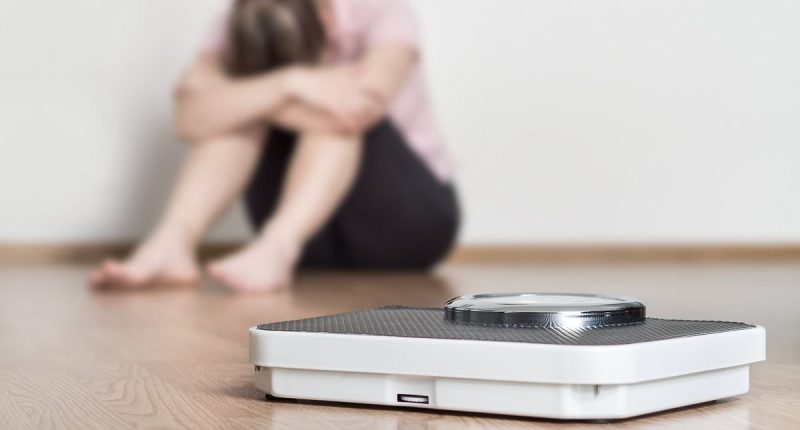Share this @internewscast.com
Millions of Americans taking a common drug are twice as likely to become obese, a major study revealed.
One in 10 Americans take antidepressants and rely on them to reduce anxiety, ease depression and improve overall mental health.
However, the pills could come at the cost of another health crisis.
Tracking over 3,000 adults, Spanish researchers found people who took antidepressants for six years on average gained up to twice more body weight than non-users.
And even after accounting for diet, exercise and overall mental health, the drugs’ effects compounded over time.
Roughly one in four people in the study gained more than five percent of their body weight – an increase medically linked to a heightened risk of diabetes, heart disease, and joint problems.
Participants who started taking antidepressants during the study gained an additional three percent of their total body weight, while long-term users (already on the drugs at the start of the study) gained two percent.
Dr Gabriela Lugón, a researcher at the Hospital del Mar and Pompeu Fabra University in Barcelona, said: ‘We cannot simply prescribe antidepressants for their positive effects without also considering this side effect.’

While the average person in the study gained about one percent body weight, long-term antidepressant users faced sharper weight gain and doubled obesity odds
Depression affects roughly 21 million Americans and anxiety strikes 40 million, making them two of the most common mental health disorders in the country.
Selective serotonin reuptake inhibitors (SSRIs), the most common type of antidepressants, whose side effects include weight gain, are prescribed to treat both by increasing levels of mood-regulating hormone serotonin.
While today’s antidepressants work better and cause fewer side effects than older versions, all still come with downsides — both right away and over time. Common issues include sleep problems, dizziness, digestive troubles, sexual dysfunction, and— critically — weight gain.
Unwanted pounds are a top reason people stop taking these medications, forcing doctors and patients to constantly weigh the pros and cons.
Dr Víctor Pérez, head of the Psychiatry Department at Hospital del Mar, said that while the drugs are highly effective, ‘their effect on weight is not universal, although certain medications, such as mirtazapine and paroxetine, can cause significant weight gain.’
Researchers recruited 6,352 adults ages 35 to 79 from northeastern Spain in 2005 and followed them for six years.
Participants were divided into four groups based on their antidepressant use: never used, new users starting during the study, quit users (stopped by the time of follow-up) and long-term users who were already on antidepressants when the study started and continued taking them through the six-year follow-up.
Nurses recorded each person’s weight and height at the start of the study, as well as their diet (using the Mediterranean diet as the standard), exercise habits, symptoms of depression, smoking history, diabetes status and blood pressure.
The researchers wanted to focus specifically on the percent body weight gain and the number of new obesity cases characterized by a body mass index (BMI) of 30 or higher.

The percentage of adults who said they have been diagnosed with depression during their life
Every study participant gained weight, whether they were taking antidepressants or not, but those who were taking antidepressants gained more.
On average, never users gained 0.8 percent of their body weight. Those who discontinued use gained 2.2 percent and new users gained 2.5 percent. Long-term users gained 1.7 percent.
This means antidepressant users gained at least twice the amount of weight as those who never took the drugs.
Dr Camille Lassale, a researcher at the Hospital del Mar Research Institute, said: ‘All individuals taking antidepressants had a higher likelihood of gaining weight and developing obesity. This risk is even greater for those who use these medications continuously.’
Experts do not know for sure why antidepressants cause weight gain, but serotonin is the link.
Most antidepressant medications, such as Prozac, Zoloft, Effexor, and Cymbalta, alter levels of serotonin in the brain to regulate mood and emotion.
SSRIs block the reabsorption of serotonin so that more of this ‘good mood’ chemical stays in the brain, while serotonin-norepinephrine reuptake inhibitors block the reabsorption of serotonin as well as norepinephrine, an energy-regulating chemical.
The neurotransmitter that regulates mood and anxiety levels also acts like a traffic light for hunger.
After first starting an SSRI, the brain experiences a boost in serotonin, which reduces impulsivity and increases satiety, leading the person taking the medicine to eat less.
But after about a year on the medication, the brain begins to adapt by turning down receptors in the brain that serotonin clings to, creating what is known as serotonin resistance.
This causes the body to crave a quick fix in the form of carbs or sweets, which temporarily boost serotonin levels while leading to weight gain over time.
Dr Pérez said: ‘Due to the risk of patients discontinuing treatment because of weight gain, we must consider alternative therapeutic strategies to complement pharmacological treatment.’
But doctors caution against abruptly stopping an antidepressant regimen without the input of a doctor, who typically tapers the patient off the medicine gradually over several weeks to avoid withdrawal symptoms, some of which can be severe.
They include flu-like aches, dizziness, mood swings, sleep problems, and ‘brain zaps,’ referring to feelings of electric shocks shooting through the head.
The study was published in Frontiers in Psychiatry.
















